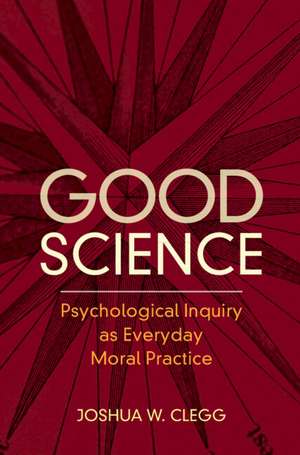Good Science: Psychological Inquiry as Everyday Moral Practice
Autor Joshua W. Cleggen Limba Engleză Hardback – 19 ian 2022
| Toate formatele și edițiile | Preț | Express |
|---|---|---|
| Paperback (1) | 280.53 lei 6-8 săpt. | |
| Cambridge University Press – 19 ian 2022 | 280.53 lei 6-8 săpt. | |
| Hardback (1) | 694.98 lei 6-8 săpt. | |
| Cambridge University Press – 19 ian 2022 | 694.98 lei 6-8 săpt. |
Preț: 694.98 lei
Preț vechi: 808.12 lei
-14% Nou
Puncte Express: 1042
Preț estimativ în valută:
132.99€ • 137.95$ • 110.89£
132.99€ • 137.95$ • 110.89£
Carte tipărită la comandă
Livrare economică 27 martie-10 aprilie
Preluare comenzi: 021 569.72.76
Specificații
ISBN-13: 9781316519752
ISBN-10: 1316519759
Pagini: 160
Dimensiuni: 157 x 235 x 15 mm
Greutate: 0.45 kg
Ediția:Nouă
Editura: Cambridge University Press
Colecția Cambridge University Press
Locul publicării:New York, United States
ISBN-10: 1316519759
Pagini: 160
Dimensiuni: 157 x 235 x 15 mm
Greutate: 0.45 kg
Ediția:Nouă
Editura: Cambridge University Press
Colecția Cambridge University Press
Locul publicării:New York, United States
Cuprins
Introduction; Part I: Clearing the Ground: 1. Scientism; 2. Objectivism; 3. Instrumentalism; Part II. Good Science: 4. What scientists do; 5. Justification; 6. An open disciplinary politics; 7. A committed research praxis; Part III. Charting the Moral Geography of Psychological Research: 8. Domain and theory choice; 9. The design and conduct of research; 10. The interpretation and reporting of research; 11. Conclusion; Appendix A: Instructor's guide; Appendix B: An example master's-level curriculum; Appendix C: Questions to aid moral reflection in research design; References; Index.
Recenzii
'For any psychologist who aspires to do good science, Clegg's lucid account of the halting and stumbling path we have heretofore taken toward this goal is simply a must-read.' Alexandra Rutherford, York University, Canada
'Clegg offers a hard-hitting, but artful and engaging, critique of the myth that scientists are capable of navigating around the moral 'geography' of science. This book is a must-read for any student, teacher, or researcher in psychology with genuine interest in creating and participating in legitimately good science.' Kathleen L. Slaney, Simon Fraser University, Canada
'In the midst of pandemic, just when we need him, the brilliant critical psychologist Joshua Clegg publishes Good Science, a text that re-sutures science to moral geography. This book stitches a critique of science with a radical imagination for scientific practice with deep moral attention. The question is not 'if' science, but 'how,' with whom, and toward what end. Writing at the nexus of philosophy of science, critical theory, and social psychology, and pitched toward seasoned social scientists, graduate students, and undergraduates, Good Science carves a path toward just research. At a time when the dominant debate is 'pro-science' vs. 'anti-science,' Clegg introduces an ethical nuance - 'good' science. Thank you, Josh, for a text that is at once brilliant and moral, complex and accessible, intellectually bold and humble. Classic Clegg.' Michelle Fine, City University of New York Graduate Center, USA
'Joshua Clegg provides a much-needed articulation of what went astray in psychology's obsession with objectivism. Connecting epistemology with ethics and demonstrating the entanglement of what we know with what we should do, he envisions a discipline where questions of the just and good take center stage in researching psychosocial life. In convincing detail, Clegg argues that it is not only possible, but necessary, to be a moral agent in psychological studies, and that epistemic justice is an achievable goal.' Thomas Teo, York University, Canada
'Impressive in scope and command, Good Science deftly casts scientific practice as an irreducibly moral endeavor. Clegg integrates a wide range of ideas in a clear and compelling new synthesis, entreating psychologists at all levels of expertise to grapple with the personal and communal obligations of systematic inquiry.' Lisa M. Osbeck, University of West Georgia, USA
'Clegg offers a hard-hitting, but artful and engaging, critique of the myth that scientists are capable of navigating around the moral 'geography' of science. This book is a must-read for any student, teacher, or researcher in psychology with genuine interest in creating and participating in legitimately good science.' Kathleen L. Slaney, Simon Fraser University, Canada
'In the midst of pandemic, just when we need him, the brilliant critical psychologist Joshua Clegg publishes Good Science, a text that re-sutures science to moral geography. This book stitches a critique of science with a radical imagination for scientific practice with deep moral attention. The question is not 'if' science, but 'how,' with whom, and toward what end. Writing at the nexus of philosophy of science, critical theory, and social psychology, and pitched toward seasoned social scientists, graduate students, and undergraduates, Good Science carves a path toward just research. At a time when the dominant debate is 'pro-science' vs. 'anti-science,' Clegg introduces an ethical nuance - 'good' science. Thank you, Josh, for a text that is at once brilliant and moral, complex and accessible, intellectually bold and humble. Classic Clegg.' Michelle Fine, City University of New York Graduate Center, USA
'Joshua Clegg provides a much-needed articulation of what went astray in psychology's obsession with objectivism. Connecting epistemology with ethics and demonstrating the entanglement of what we know with what we should do, he envisions a discipline where questions of the just and good take center stage in researching psychosocial life. In convincing detail, Clegg argues that it is not only possible, but necessary, to be a moral agent in psychological studies, and that epistemic justice is an achievable goal.' Thomas Teo, York University, Canada
'Impressive in scope and command, Good Science deftly casts scientific practice as an irreducibly moral endeavor. Clegg integrates a wide range of ideas in a clear and compelling new synthesis, entreating psychologists at all levels of expertise to grapple with the personal and communal obligations of systematic inquiry.' Lisa M. Osbeck, University of West Georgia, USA
Notă biografică
Descriere
This is a refreshing account of psychological science that focuses on moral responsibility, collective commitment, and justice.
